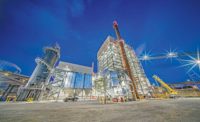"That's the kind of uncertainty that spooks developers," Levine says of the new and pending regulations.
An Uncertain Market
While the Gainesville plant is on its way to completion, the future of other biomass facilities in the Southeast and throughout the nation is not assured. Most southeastern states don't have a renewable portfolio standard or policies that make biomass and other renewable energy necessary—and therefore more attractive to developers and financiers. But more immediately, the current low price of natural gas makes it tough for a utility to justify paying a higher cost to build a biomass plant.
"It's great when it's at $2 [per million British thermal units], but it could easily be 10 times that much," Cleaves says of the price of natural gas, which has had a history of rising and falling sharply. If the price of natural gas remains low, however, projects like Gainesville may remain the rare exception. Fagen says his firm is pursuing three more biomass plants, but the timing on their construction remains up in the air.
Despite that, industry promoters like Cleaves point out that, unlike other renewables such as wind and solar power that depend on the weather and the time of day, biomass can provide baseload electricity without interruption. Biomass also gives utilities desired fuel diversity. Says Cleaves: "There will always be a role for biomass if at the local and state level they are interested in diversity."







